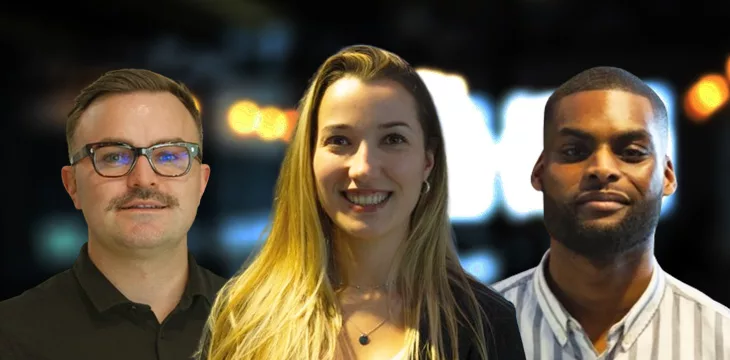|
Getting your Trinity Audio player ready...
|
Charles Miller is once again exploring innovative ventures in the Block Dojo incubator program on this week’s CoinGeek Conversations. Rafaela Azevedo’s The Chain Academy trains developers for Web3; Kenneth Kelly’s Revested streamlines real estate transactions; and Marcus Odubonojo’s Motion Shield simplifies car accident reporting—all showcasing the potential of blockchain technology.
Kicking off our series of interviews, we begin with Rafaela Azevedo, the founder of The Chain Academy, who takes a unique approach to training developers for the rapidly evolving Web3 space. Rafaela’s journey into the tech industry is influenced by her tech background, as she explains that “all my family is in tech.”
Her parents, both developers, played a significant role in shaping her passion for technology. Growing up surrounded by the world of coding, Rafaela embarked on her coding journey at a very young age. “I was coding when I was six years old with my dad. I just got really passionate about the idea and just went for it,” she recalls.
The Chain Academy is an educational platform for developers entering Web3. The training program not only focuses on individual skill development but also aims to link developers with potential employers. “They are going to be skilled up to collaborative commercial projects where they can actually have their first experience and create a portfolio,” she notes.
The Chain Academy offers a unique learning experience with a step-by-step approach, short videos and text, catering to individuals with varying attention spans. In addition, AI technology will be used to provide instant feedback to developers, assessing their strengths and areas for improvement.
The Chain Academy’s roadmap includes a commitment to addressing various blockchains, starting with Solidity and Ethereum and expanding to others such as the BSV Blockchain. As for the company’s revenue model, Rafaela says it will include a subscription model for developers and fees for businesses posting projects.
Next was Kenneth Kelly’s Revested, a blockchain-based business that aims to simplify and expedite the process of buying and selling houses. Kenneth is keen to point out that Revested utilizes blockchain technology to eliminate old practices in the real estate industry. “The problem in the industry, going back to my grandfather’s time, would be that one in three property sales fall through, and on average, it takes between three and six months. So, you know, huge problem within the space.”
Revested addresses these challenges by streamlining mundane processes, especially with compliance and regulation. As Kenneth explains, “KYC when you come on to Revested is simple… you enter your name, email, passport, and take a photograph of yourself. We then upload your property title deeds, which we can cross-check using machine learning against the land registry document.”
Blockchain technology will be used in the digital exchange for property transactions. “We’re building a custom layer two platform, essentially a digital exchange to connect a wallet dependent upon the currency and to be able to trade that currency in and out of the exchange.”
Kenneth envisions a future where property tokenization enables instantaneous transactions. “You could be down in the pub on a Friday, and you could be selling your property in minutes instantly,” he says.
However, Charles raises concerns about the potential risks and the necessity for a thoughtful decision-making process in real estate transactions. Kenneth responds by highlighting the role of machine learning in scanning title deeds for underlying issues, saying, “there’s new machine learning models that are really pushing boundaries within the legal space.”
When asked about the business model, Kenneth explains “we would take a percentage of transaction fees based on the size and volume of the transaction.”
With a team of experts in blockchain technology, data analysis, and property valuation, Revested seeks to bring efficiency, transparency, and speed to real estate, challenging traditional practices. “We know there’s hurdles to get over within the legal space, but we are looking to push the boundaries and disrupt a very traditional model,” he stresses.
We now delve into the unique perspective of the final interviewee, Marcus Odubonojo, founder of Motion Shield. As Marcus explains, Motion Shield will address the challenges faced by frustrated drivers in dealing with the complicated task of reporting incidents to insurance companies.
“So what we have seen in society to date is the fact that we have frustrated drivers who unfortunately have been involved in a car accident, and the processes involved in reporting the incident to that insurance company is just far too difficult and it’s just additional work,” he says.
Motion Shield aims to solve that problem by digitizing road incident reporting processes, providing drivers with a user-friendly app. “You can record the incident, exchange details with other drivers, verify the time and location, and add notes, for example, a statement of the incident, which pictures or videos can’t,” he explains.
Motion Shield uses blockchain technology by storing critical evidence, such as pictures and videos taken at the scene, to enhance the integrity of data and ensure its secure storage.
Marcus envisions Motion Shield not only simplifying processes for drivers but also benefiting insurance companies. “Companies know that the car systems that they are using, cost them too much money because they’re not profitable at the moment.” By utilizing Motion Shield’s products and services, insurance companies can save time and resources, resulting in substantial savings.
Currently, Marcus is in discussion with various insurance companies. According to him, the goal is to onboard customers through a free trial, allowing them to experience the platform’s benefits firsthand.
Hear the whole of Rafaela Azevedo, Kenneth Kelly and Marcus Odubonojo’s interviews in this week’s CoinGeek Conversations podcast or catch up with other recent episodes:
You can also watch the podcast video on YouTube.
Please subscribe to CoinGeek Conversations – this is part of the podcast’s new series. If you’re new to it, there are plenty of previous episodes to catch up with.
Here’s how to find them:
– Search for “CoinGeek Conversations” wherever you get your podcasts
– Subscribe on iTunes
– Listen on Spotify
– Visit the CoinGeek Conversations website
– Watch on the CoinGeek Conversations YouTube playlist

 08-27-2025
08-27-2025 





